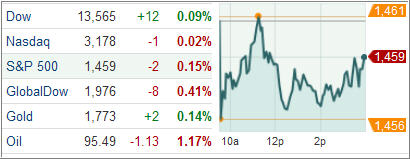Despite the housing market showing signs of improvement in September, US stocks closed mostly lower for the second straight day Tuesday on uncertainties in Europe as Spain continues to drag its feet over seeking a formal bailout from the European Central Bank despite Spanish 10-year borrowing costs edging higher in recent auctions.
My view of why Spain is so hesitant to apply for an official bailout is simply the fact that what may come to light in respect to the true state of their financial affairs may be if not downright shocking but at least very surprising. Of course, complying with the conditions of such a bailout may very well be a career ending move for some of the top echelon of the politicians involved.
As a result of that uncertainty, Treasury yields dropped for the second day as prices edged up, recouping about half the losses suffered since the Fed Chairman Bernanke announced plans to buy more mortgage-backed securities last week. Demand for safe haven assets surged despite the US housing sector improving in September as Europe weighed on investors.
The benchmark 10-year Treasury yield dropped three basis points to 1.81 percent even as the National Association of Builders/Wells Fargo housing-market index added 3 points in September to a seasonally-adjusted reading of 40.
Separately a Commerce department report showed the US current account deficit contracted to $117 billion in Q2 from $133 billion as oil imports fell and services revenue from abroad grew over the first quarter. 30-year Treasury bond yields fell three basis points to 3.01 percent after media reports suggested Spain may seek formal assistance after regional election in Galicia and Basque finish up on October 21.
Meanwhile, the dollar rose for the second day as tensions between China and Japan continued to rise and Europe remained divided over unification of the banking sector. The dollar index, a benchmark that tracks the greenback against a basket of six global currencies, rose to 79.226 from 79.045.
Across the Atlantic, banks and oil firms led the decline in European stocks as Madrid continued to drag its feet over seeking financial aid from the ECB, as head of eurozone finance ministers Jean Claude Juncker said Tuesday that bailout conditions would be ‘very tough’ for the debt stricken country.
The pan-European Stoxx Europe 600 index fell 0.4 percent on the day.
In Germany, led by automobile majors BMW and Volkswagen, the DAX 30 index tumbled 0.8 percent as new car registrations across Europe dropped 8.9 percent in August. The CAC 40 index slumped 1.2 percent in Paris banks, oil firms and carmakers declined.
In London, mining firms and oil companies tripped, dragging down the FTSE 100 index 0.4 percent. HSBC holding also weighed on the benchmark as the banking heavyweight slipped 0.9 percent.
In the ETF space, Europe-linked funds got hammered over Madrid’s reluctance to seek formal help from the European Central Bank. The iShares MSCI Italy Index Fund (EWI) lost 3 percent while the iShares Spain index Fund (EWP) trimmed 1.67 percent on the day. EWI has added 10.15 percent so far this month while EWP has jumped 12.25 percent.
The State Street SPDR S&P Oil & Gas Exploration & Production (XOP) lost 1.97 percent after yesterday’s sudden crude futures selloff continued to spook investors. The United States Natural Gas Fund (UNG) also finished 2.01 percent lower for the day.
Disclosure: No holdings
Contact Ulli
